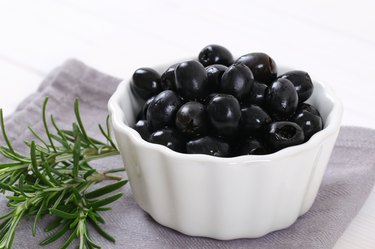
Olives are enjoyed not only for their oil, but also for their meaty, briny flesh. Even as far back as Old Testament times, olives were celebrated and even revered — with countless mentions in the Bible itself. The olives eaten in America today are likely much different from the olives in the ancient Mediterranean lands in which they were first cultivated. Canned black olives are the type most commonly available on grocery store shelves, but these have little nutritional value and are high in sodium.
Read more: Health Benefit of Black Olives
Video of the Day
Video of the Day
Olives Nutrition Facts
Look at your can of black olives, and you'll likely see them described as "ripe." But this is a misnomer, according to the Olive Oil Source. In fact, black olives are green and unripe when picked, but a curing process gives them their color, flavor and soft texture.
Raw green olives are soaked in a water and lye solution with piped-in oxygen for two days, and then rinsed. They are then soaked in a brine solution with ferrous gluconate — an iron salt of gluconic acid that's naturally found in fruits and vegetables. The combination of all of these substances gives the olive its black color.
Unlike other varieties of black olives, such as kalamata — which are simply cured and not cooked — canned black olives are cooked. All canned foods have to be cooked to destroy bacteria. Cooking makes them softer and milder in flavor, and it also reduces their nutrient content, because nutrients leach into the brine when it's heated above a certain temperature.
Read more: Are Canned Olives Healthy Food?
Black Olives Nutrition
Per ounce, canned black olives provide 33 calories, 0.25 grams of protein, 3 grams of fat and 1.7 grams of carbohydrates, of which 0.5 grams are dietary fiber. The calories, protein, fiber and carbs in olives contribute very little to your total daily needs, but the fat content per serving is significant for such a small portion of food. Olives are known to be high in fat, but it's primarily monounsaturated fat, which is considered healthy because it can help lower your bad cholesterol for improved heart health. Of the 3 grams of fat, a little over 2 grams are monounsaturated.
Canned black olives are a poor source of vitamins and minerals, providing less than 1 percent of the recommended dietary allowance (RDA) for all nutrients beside iron and sodium. Because of the ferrous gluconate used in the curing process, canned black olives have almost 2 milligrams of iron. That amount is 11 percent of the RDA for women and 25 percent of the RDA for men.
Because they're cured in a salt brine, all olives are high in sodium. Sodium is an electrolyte mineral that helps balance fluids in your body. While you need sodium in your diet, most people consume too much. Excess amounts of this mineral can cause it to build up in your blood, which can lead to high blood pressure. One ounce of canned black olives provides 209 milligrams of sodium, which is 14 percent of the 1,500 milligrams that the Food and Nutrition Board estimates most adults need each day.
Health Benefits of Olives
Eaten in moderation, olives aren't bad for you. However, one serving is about four large olives — and many people tend to eat more than that in a sitting. This can significantly increase your sodium intake and, in addition to the sodium you consume from other foods during the day, put you over your daily limit. For people who are at risk of or already have high blood pressure, this can be unhealthy.
However, canned black olives are lower in sodium than other types of black olives, such as kalamata, which provide more than 600 milligrams of sodium per ounce. In light of this, canned black olives, in moderation, may be a better choice for hypertensive or pre-hypertensive individuals.
Canned black olives are also lower in calories and carbs and are a better source of iron than kalamata olives. However, kalamatas are higher in healthy fats and dietary fiber, with 4.7 and 1.9 grams, respectively.
Read more: How to Lose Weight With Olives
- National Geographic: The Bitter Truth About Olives
- Olive Oil Source: Are Olives Dyed to Make Them Black?
- Tomah Journal: Ask Your Science Teacher: Green vs. Black Olives
- Healthline: How Cooking Affects the Nutrient Content of Foods
- USDA National Nutrient Database: Olives, Ripe, Canned (Small-Extra Large)
- Zingerman's: Guide to Olives
- MedlinePlus: Monounsaturated Fat
- Food and Nutrition Board, Institute of Medicine, National Academies: Dietary Reference Intakes (DRIs): Recommended Dietary Allowances and Adequate Intakes, Elements
- MedlinePlus: Sodium
- USDA Branded Food Products Database: Kalamata Olives Pitted